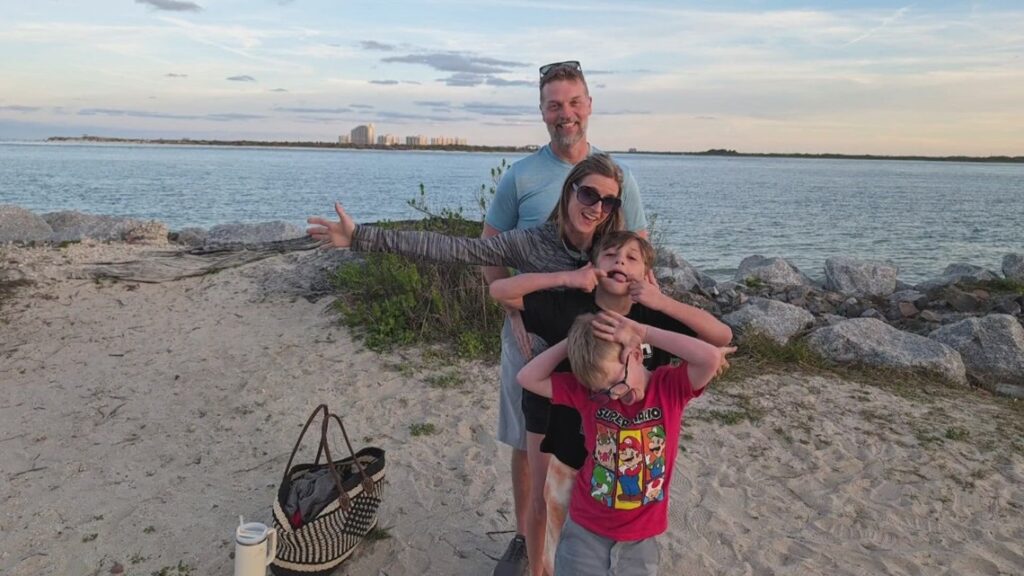Chris Prewitt said he’s grateful to be able to spend Father’s Day weekend with his sons, after suffering a heart attack just after Christmas last year.
AVON LAKE, Ohio — June is Men’s Health Awareness Month and, naturally, Father’s Day is this weekend, so now’s the perfect time to sit down with your dad and discuss his health history, and Chris Prewitt tells us it could save your life.
“My story is pretty wild,” says Chris, of Avon Lake. “I turned 48 at the end of last year and have been focusing on my health my whole life. I’ve run the Cleveland City Marathon, a 5K and a 10K, and I’ve been doing CrossFit on and off for the past 12 years.”
RELATED: More from WKYC Health Hub
Clearly, he’s the type of guy who prioritizes health, and for good reason: He lost both parents at a young age, in part due to their lifestyle choices.
“So my whole life I’ve been very focused on maintaining fitness, health, good eating habits, good sleeping habits, exercise,” he explained.
Last winter, Prewitt’s wife gave him some personal training sessions, and he booked his first one for Dec. 27, two days after Christmas, a day that would change his life and perspective forever.
“When I worked out, I felt like something was wrong,” he recalled. “My triceps, biceps, chest, upper back, everything was really sore.”
Chris thought to himself, he’s almost 49, and with two sons, ages 6 and 9, maybe age is catching up with him. He’d been feeling tired and a little low on energy lately, but this time felt different.
His trainer and doctor recommended he get checked out, and his wife and kids picked him up and drove him to a local emergency room, but his wife missed the exit. That’s the last thing Chris remembers before slumping in his seat and passing out.
“It was cold to the touch and something was obviously wrong,” Prewitt said. “The next exit was Richard Jacobs Cleveland Clinic Avon Hospital. She ran three red lights to get there and ran inside. Frontline workers came out, pulled me out of the car, put me on a stretcher and took me inside.”
Chris later learned it took 20 minutes of CPR and 12 defibrillator shocks to stabilize his heart rate, after which he was rushed to Cleveland Clinic Fairview Hospital for emergency stent surgery.
“I was relatively young and healthy when I had my heart attack,” he said. “My cardiologist told me that all my other arteries were normal, but that my side branch, the descending artery, was completely blocked.”
The first lesson from his story is that if you think your pain might be heart-related, you should head straight to the emergency department rather than rushing to the hospital.
“The difference between visiting an emergency room and visiting an urgent care is that the moment a patient with chest pain arrives, they’re triaged very differently than other patients,” says Emad Noukta, MD, an interventional cardiologist at the Cleveland Clinic.
While Chris was in the hospital surrounded by his family, he was asked about his family history. He didn’t think he had a history of heart disease, but his aunt intervened and shared that his grandfather had died of a heart attack at the same age as Chris – 48. He realized he couldn’t escape his genes.
“Knowing your genetic history is important not just for heart disease, but for any disease,” Nukuta says. “For example, if a patient is in their 50s and finds out that their father died of a heart attack in his 40s, that’s alarming.”
Chris attributes his recovery to his fitness, and after 12 weeks of cardiac rehabilitation he is now running again, but will undergo annual heart tests for the rest of his life.
He’s also teaching his sons about genetic risk, so that even when they’re young, they can learn that exercise and diet alone may not be enough when it comes to genetic risk, and he hopes other dads will heed his message.
“If just one father decides to prioritize the health of his kids, his wife and everybody else, get tested and find out there’s an issue and can take action before it’s too late, that means the world to me and helps save a life,” he said.


